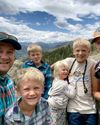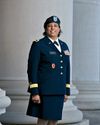
Eight police officers sat across from me in a fluorescent- lit conference room. They looked exhausted, shell-shocked. Beside me sat a fellow member of the Southwest Ohio Critical Incident Stress Management Team. We’re a group of police officers, firefighters, paramedics, chaplains and mental health professionals who help first responders deal with trauma.
It was four in the morning, August 4, 2019. We were in the headquarters of the Dayton, Ohio, Police Department. Hours earlier, these officers had been on routine patrol in Dayton’s popular and crowded Oregon District. A lone gunman wearing body armor and carrying a high-powered rifle waded into the crowd and shot 26 people in 32 seconds.
The officers reacted quickly, shooting and killing the gunman less than a minute after his rampage started. Even so, nine victims died, including the gunman’s sibling.
Encouraged by my CISM team colleague and me, the officers tried to put what they’d seen into words.
“It all happened so fast.” “Chaos, screaming—people running everywhere.”
“Impossible to tell where the shooter was.”
“Bodies kept going down.” “Fear…anger. Wishing we could have saved more people.”
We let the officers talk. That’s the most important thing you can do after experiencing a traumatic event— reach out, tell someone what you’ve gone through, put your feelings into words. I’ve learned that truth in my nearly four-decade career as a military and civilian clinical psychologist.
I speak from more than professional experience. Ten years ago, I was at Fort Hood, Texas, when a lone gunman killed 13 people and wounded 32 others.
I was a soldier then, part of a combat stress control unit preparing to deploy to Afghanistan.
This story is from the November 2019 edition of Guideposts.
Start your 7-day Magzter GOLD free trial to access thousands of curated premium stories, and 9,000+ magazines and newspapers.
Already a subscriber ? Sign In
This story is from the November 2019 edition of Guideposts.
Start your 7-day Magzter GOLD free trial to access thousands of curated premium stories, and 9,000+ magazines and newspapers.
Already a subscriber? Sign In

What prayer can do
POWER IN OUR DAY-TO-DAY LIVES

Rejoice in All Things
My husband and I had an annual tradition of celebrating the high points of the year. This time, he wanted to try something different

Special Delivery
A month after my wife died and my life felt so empty, the only thing I had to look forward to was Amazon

A Prayer for Cullen
Even in a family crisis, I had trouble quieting my mind enough to listen for God

Blackie & Rosebud
What would happen to my friend's cats now that she was gone?

The Kids Are Alright
My twin boys and I had always been close. I thought they needed me. Now I wasn't so sure

Kindred Spirits
I thought the nose ring gave it away—she was just another teenager. I couldn't imagine how she could help me

A Boy Named Sue
In 1969, Johnny Cash and his wife, June, threw a party at their house in Hendersonville, Tennessee, a “guitar pull,” where guests passed around a guitar and tried out new songs.

Active Duty
I'd tried everything for my knee - physical therapy, gel injections, a cumbersome brace. Everything except prayer

Living an Abundant Life
A conversation with spirituality and health researcher Harold G. Koenig, M.D., on what makes people truly happy